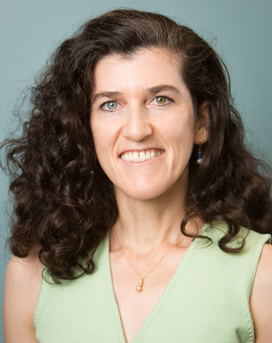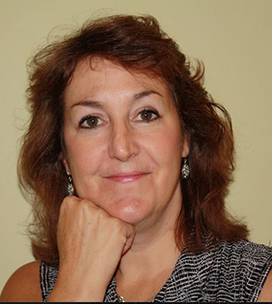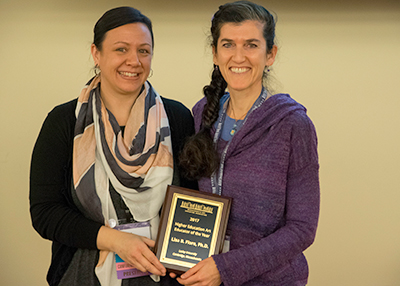As the daughter of an artist, Lisa Fiore grew up in a household surrounded by glue, popsicle sticks, markers, pastels, clay, cameras and more.

Professor Lisa Fiore won the 2017
“Higher Education Art Educator
of the Year” award.
When she became an early childhood educator, Fiore instinctively wove art throughout her teaching.
“I can’t imagine teaching students without using art, music, drama and movement,” she says. “No matter what age students are, integrating the arts into the learning experience makes it richer, enjoyable and more meaningful.”
Now the Massachusetts Art Education Association (MAEA) has honored Dr. Fiore with the 2017 “Higher Education Art Educator of the Year” award. Fiore has been a professor of early childhood education at Lesley since 2002.
The MAEA also recognized Lesley alumna, former Director of the Creative Arts Division, and longtime instructor Lisa Donovan with the “Friend of Art Education of the Year” award. Both awards were presented during the annual MAEA conference, held on our Porter Campus last month.

Instructor Lisa Donovan won the
“Friend of Art Education of the
Year” award.
“I’m so honored to receive this award,” says Dr. Donovan, who is a professor at the Massachusetts College of Liberal Arts. “MAEA has supported arts educators and arts students engaged in the visual arts in profound ways.”
The MAEA conference, which ran Nov. 12 and 13, included research presentations, hands-on workshops, keynote speaker Jane Best, an awards ceremony, and an art exhibition, titled “Clearly Defined,” staged in the Parker Gallery in the University Hall Atrium.
“The conference, titled ‘Redefining Art Education,’ found a perfect home at Lesley,” says Associate Professor Maureen Creegan-Quinquis, division director of the Creative Arts Division, and a conference organizer. “Lesley’s reputation for creativity and for transforming students’ lives and teacher practice through the arts is nationally known. This conference drew and showcased some of the most innovative thinking in K-12 visual arts education. Presentations contained the latest strategies in everything from classroom apps to robotics.”
Q&A: Our award recipients reflect on the importance of arts in education.
LISA FIORE
Professor Lisa Fiore teaches early childhood education and has a background in developmental and educational psychology.
Q: How do arts and education intersect for you?
Dr. Fiore: The arts and play are early childhood curriculum. All aspects of young children’s development benefit from exposure to and exploration with different materials. It’s one thing to talk about snow, for example, and quite another to touch it, add color to it, paint with it, and notice how it changes when it’s brought inside from the outdoors.

Lisa Fiore (right) accepts the award from MAEA President Kristi Oliver.
Q: Why is arts integration important?
Dr. Fiore: The climate for students has changed a lot over the last decade or so. Some early childhood classrooms reflect external pressure for children to know and do things that aren’t developmentally appropriate, so intentional early childhood practitioners consider it really important to have hands-on, open-ended, arts experiences as the primary, playful practice through which children learn and take great pleasure in learning.
Q: What is your message to our future teachers?
Dr. Fiore: Thankfully, most early childhood education students and practitioners already possess a value system that places the arts at the core of early childhood curriculum. What I do hope that students recognize is that the process of making enhances the knowing.
Q: What did you think when you won Higher Education Art Educator of the Year?
Dr. Fiore: I felt surprised, humbled, and really proud to represent higher education through the specific work that I do to help prepare future early childhood educators and help professionals who can find their own inspiration and impact the lives of children and families.
LISA DONOVAN
Adjunct professor Lisa Donovan holds a Ph.D. from Lesley and began teaching here in 1998.
Q: How do arts and education intersect for you, and why is arts integration important?
Dr. Donovan: My research, writing and practice have focused on the impact of arts integration, The data point consistently to the power of the arts to lead to deep learning, more engaged learners and ownership of learning, for students and more engagement and creative pedagogy for teachers.
Q: How do you share this knowledge with other educators?
Dr. Donovan: When Lesley colleague Linda Dacey (now a professor emerita) invited me to co-author a book on arts integration in math, I saw the possibilities for publishing about flexible, arts strategies that can be used across the curriculum. The rest of the series emerged from that preliminary conversation with Linda and Shell Education, and we have coedited and published “Integrating the Arts Across the Content Areas” (2012); “Strategies to Integrate the Arts in Language Arts” (2013); and “Strategies to Integrate the Arts in Mathematics” (2013). It felt like the right next step was to get the strategies in the hands of teachers.
Q: Are these concepts unique?
Dr. Donovan: In my time at Lesley I had the chance to work with teachers around the country and internationally. In this work, I saw so many innovative uses of the arts strategies we were introducing to teachers. Teachers gravitate to this work because it’s effective and it’s enjoyable.
And unfortunately it is unique, because the arts have too often been marginalized in education.
Q: What is your current focus?
Dr. Donovan: My current work at Massachusetts College of Liberal Arts investigates systemic changes. Focusing on a regional vision for arts education in rural areas has allowed me to engage in deep cross-sector work grounded in a collective impact grant I received from from the National Endowment for the Arts. I’m interested in advancing the role of arts in education and the only way to move the needle is to engage with people across areas including policy people, funders, arts organizations, teachers, arts educators, educational leadership, parents, business leaders and beyond.
Learn more about Lesley’s Arts Educator programs.